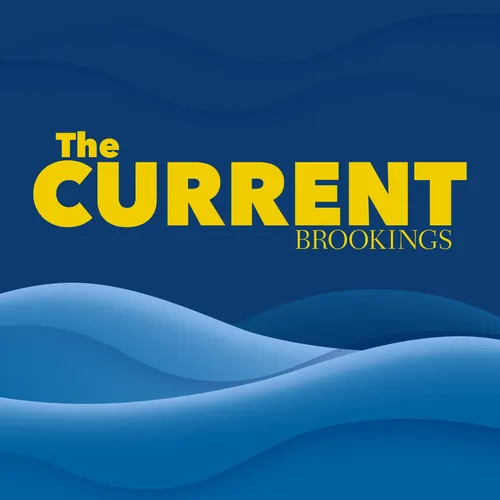
The Current
The Current brings you smart, timely, and quick analysis from Brookings experts on breaking news and changing policies. In under ten minutes, learn not only what happened, but why, and how to make sense of it.
- Update frequency
- every 14 days
- Average duration
- 19 minutes
- Episodes
- 101
- Years Active
- 2021 - 2025

How resilient is New Orleans today?
20 years after Hurricane Katrina made landfall along the Gulf Coast, researchers from New Orleans, Brookings, and The Data Center are examining how the city has recovered and the challenges it still…

How do we know if US strikes on Iran’s nuclear facilities were successful?
Mara Karlin, a visiting fellow at Brookings and former U.S. assistant secretary of defense for strategy, plans, and capabilities, discusses the recent U.S. attack on Iranian nuclear facilities, the I…

The moral dimension of AI for work and workers
Molly Kinder, fellow in Brookings Metro, reflects on the moral and ethical dimensions of artificial intelligence, work, and workers, as she lays out in her recent paper, “The unexpected visionary: Po…

What Medicaid and other safety net cuts could mean for US poverty
House Republicans are currently negotiating a budget reconciliation bill that packages extensive tax breaks with deep spending cuts to anti-poverty programs like Medicaid and SNAP. Robert Greenstein …

Closing the racial gap in economic and social power
Historically, Black Americans’ quest for power has been seen as an attempt to gain equal protection under the law, but power in America requires more than basic democratic freedoms. It’s linked with …

The US government data purge is a loss for policymaking and research
In its first two months, the Trump administration has not only laid off thousands of federal workers and shuttered agencies, but it has also purged taxpayer-funded data sets from a swathe of governme…

A playbook to counter democratic backsliding in the US and abroad
Democracy Playbook 2025, published by the Anti-Corruption, Democracy, and Security project at Brookings, identifies seven pillars that are essential to safeguard democracy worldwide and offers action…

Can the Trump administration freeze federal spending?
This week, the White House Office of Management and Budget (OMB) ordered a freeze of funding across a broad array of federal programs, leading to mass confusion around the country from local governme…

What might US rural policy look like in the Trump administration?
As the Trump administration prepares to take power in Washington, Senior Fellow Tony Pipa, host of the Reimagine Rural podcast, looks at what has happened in rural policy under the Biden administrati…

What's next for Syria and the region after Assad's fall?
On December 8, Syrian rebels took control of Damascus, the nation’s capital. Deposed dictator Bashar al-Assad fled to Russia, marking the end of a long civil war and his 24-year-long brutal reign, wh…

Election 2024 and the health of American democracy
As the U.S. heads into the final days of the 2024 elections, Kathryn Dunn Tenpas reviews the health of American democracy, the lack of guardrails against mis- and disinformation, and ways to restore …

Government spending, debt, and taxes in the 2024 election
The economy is one of the quadrennial top issues for American voters, and related to economic performance are concerns about the national debt, taxes, and government spending, especially on popular e…

Making housing more affordable
The high cost of housing is a significant economic pressure for many Americans, even as inflation has eased. Homeowners and renters alike pay increasingly higher percentages of their income on housin…

As the UN General Assembly gets underway, how are we doing on the Sustainable Development Goals?
The 79th session of the General Assembly of the United Nations opened this week in New York City. To address some of the main issues on the agenda, with a focus on sustainable development and the Sum…

Competing energy and climate visions in the 2024 presidential election
As part of the Brookings Election '24 initiative, Samantha Gross, director of the Energy Security and Climate Initiative at Brookings, talks about the energy and climate policy issues in the U.S. pre…

As Joe Biden exits the presidential race, what's next for Kamala Harris?
On Sunday, July 21st, President Joe Biden announced that he would no longer seek the Democratic Party's nomination for president in the election against Donald Trump this November. He then endorsed V…

The state of NATO at 75 and beyond
As NATO turns 75, alliance leaders gathered in Washington, presenting a united front in support of Ukraine's survival against the threat of Russia. Brookings Visiting Fellow James Goldgeier reviews t…

After the first presidential debate, what's next for Biden and Trump?
Last week, President Joe Biden and former President Trump met in Atlanta for a presidential debate. After the event, most observers focused heavily on Biden’s seemingly poor performance, while paying…

What role is AI playing in election disinformation?
Advances in artificial intelligence (AI) have the potential to amplify the spread of mis- and disinformation in elections around the world. In this historic election year, Valerie Wirtschafter breaks…

What can be done about Sudan's deepening humanitarian catastrophe?
The Horn of Africa, home to over 200 million people, is experiencing high levels of fragility from both violence and climate change. The World Food Program says that the current conflict in Sudan is …